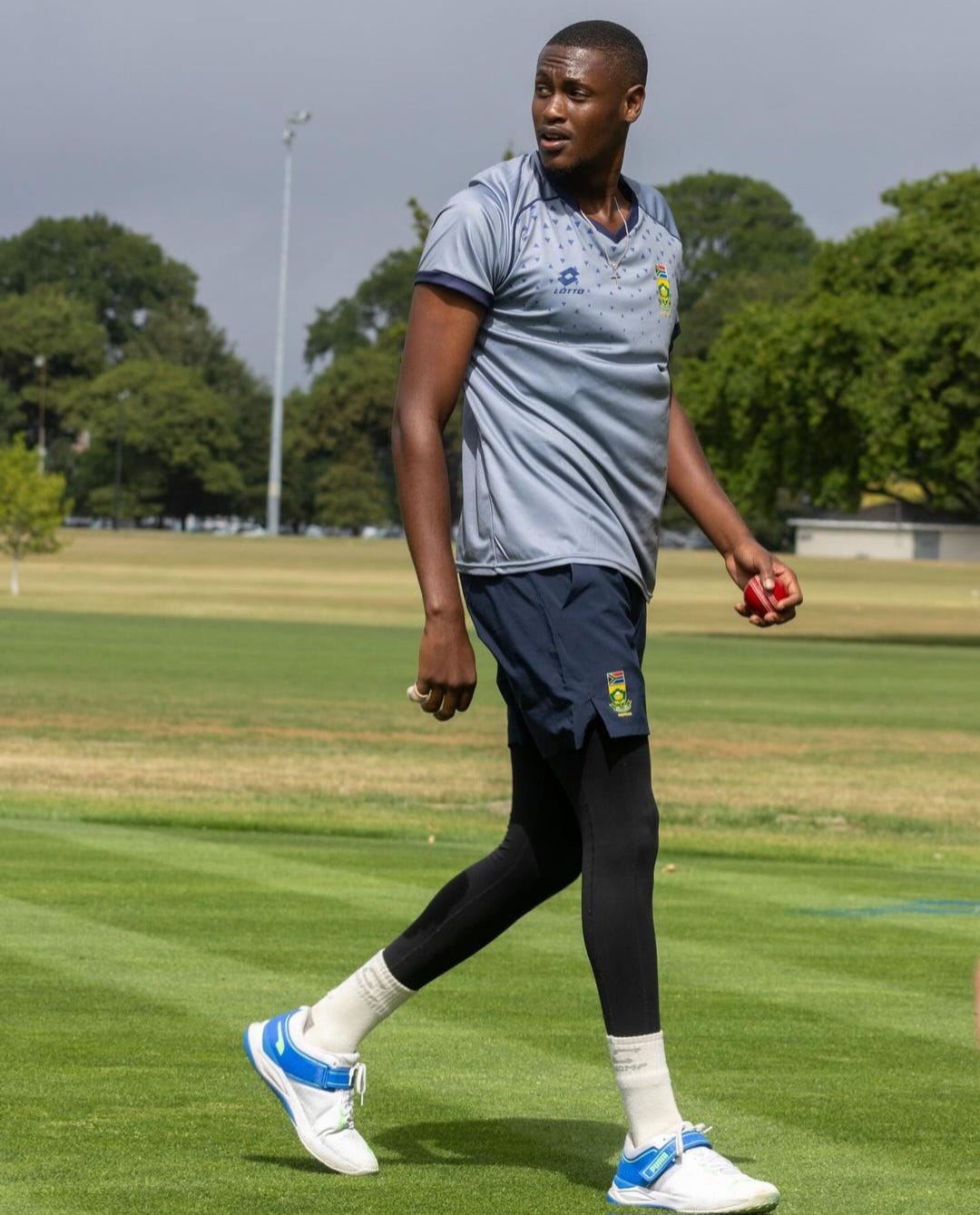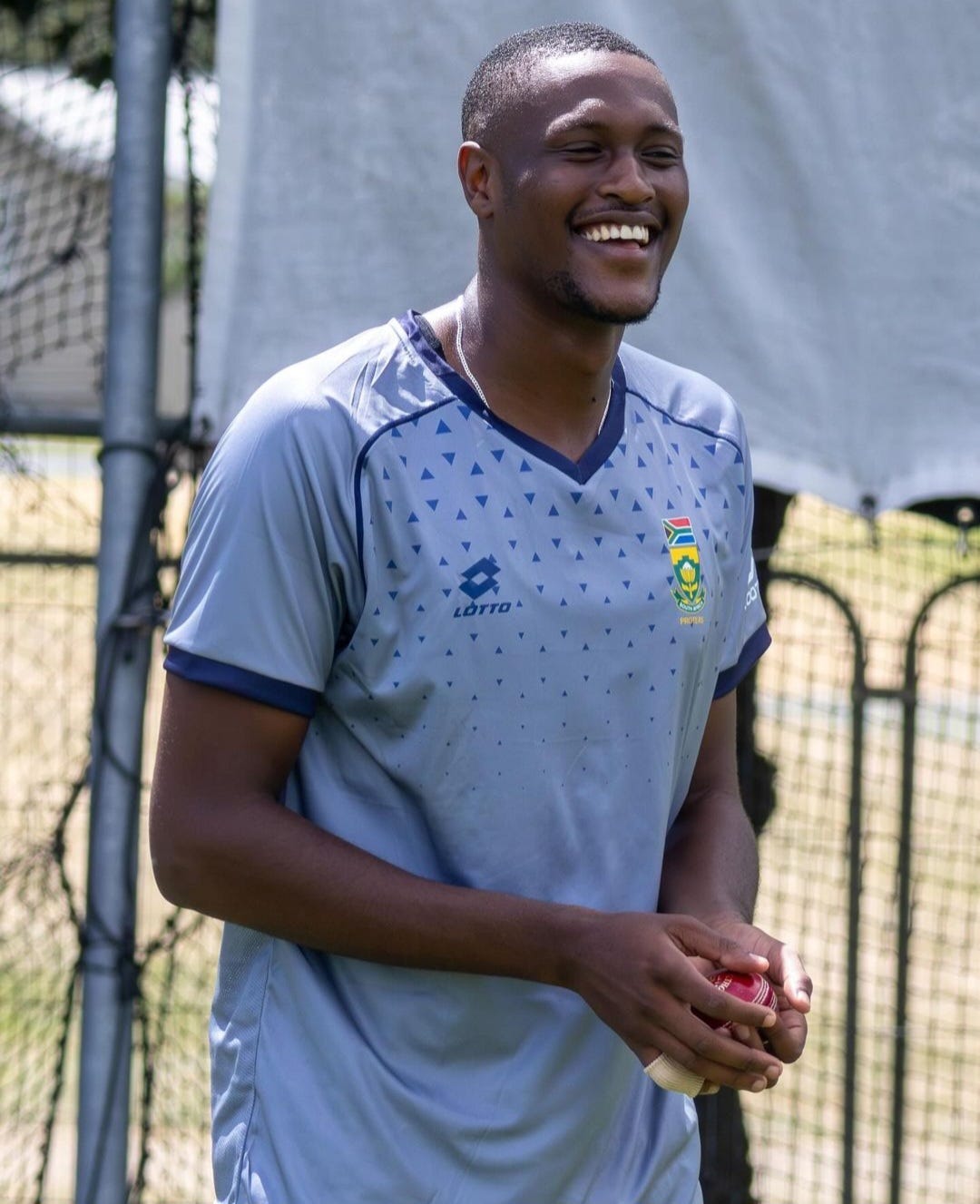Thank you for reading 438 & Beyond. If you like what you read, please click the button below, join the mailing list for FREE, and share on social media, through e-mail, or however you feel comfortable sharing.
Please consider becoming a Patron or buying a coffee to support this project and keep things going.
Did you hear about the rose that grew
from a crack in the concrete?
Proving nature's law is wrong it
learned to walk without having feet.
Funny it seems, but by keeping its dreams,
it learned to breathe fresh air.
Long live the rose that grew from concrete
when no one else ever cared. - Tupac Shakur (The Rose That Grew From Concrete)
Mihlali Mpongwana can't count the number of friends and peers he has lost to crime and gang violence on one hand. He needs all 20 of his digits, fingers and toes. Mpongwana was born and raised in the place once dubbed South Africa's murder capital. Nyanga, Cape Town, is a place where not many young men escape alive.
Here, life happens on a lower plane. Parents like Mpongwana's mother and father worked their asses off to keep families sheltered, clothed and fed, but sometimes, even their hardest was not enough, so they went to bed on an empty stomach.
That's why the 15th of May is a special day in his life. It's his birthday. It's also the day the Baker's Mini Cricket (now KFC Mini Cricket) party came to town. Mpongwana's family, parents, uncles and cousins loved sports, including cricket. Mpongwana was four when he first asked for permission to go meet them and mingle with the coaches and players. But that's not why he went. Mpongwana went for the tasty treats, biscuits and sweets.
When the Mini Cricket train left, Nyanga returned to default settings. Daily life here is different to how things are in the neighbouring township, Langa, the area’s cricket hotbed. Cricket is embedded into Langa’s fabric of life so much that kids from the area christened a piece of Rubusana Avenue Karachi.
They said that part of the road, a ragged patch of tar, behaved like a pitch on the fifth day of a Test match. Temba Bavuma's technique was tested on it when he was younger. Malusi Siboto bowled on it. Siboto and Bavuma grew up on the same street. One block up from Rubusana, on the corner of Washington and Harlem Avenue, is a pale grey house with smart aluminium windows. "Thami Tsolekile, Cricketer, Lives Here" reads the disc on the wall.
Langa Cricket Club also had Nono Pongolo and Siya Simetu among its more successful sons. Besides this quintet, the community has had several young men who have done well in the province.
About 10 km from Langa, you get to Nyanga - a totally different world. Here, you won't find bins, empty crates, old chairs or pieces of wood set up to represent stumps. Instead, you find bricks representing goalposts. Football is king.
Mpongwana joined in but with one eye on his next birthday and the cricket carnival that was inadvertently his birthday party. Over time, Mpongwana stopped attending the program for the treats, he was now in it for the game.
“I was that lone person who was always wearing white shorts and a white shirt going for cricket practice from my street. No one played cricket and no one understood what cricket was in my hood,” Mpongwana shared.
The saying goes: everyone loves a good busker because their music creates a wonderful ambience. However, for the busker to keep busking, someone needs to put some money into the hat.
I am a busker and this is my hat:
Hard places mould hard people.
“Popo has a steely character. That is what the township does to you,” Graham October shared.
His frame bellied that. When Shahied Khan first saw him at Western Cape School of Sports, he thought Mpongwana would be spirited off the campus by the Cape Town wind. Mpongwana was bowling in regular tennis shoes. Then he borrowed a bat, pads, box, helmet and gloves when it was his turn to go out in the middle and face bowlers. The gear, which looked good on an average 13-year-old boy, was oversized on Mpongwana.
“He was so slim one would think he was malnourished,” Khan recalled.
Mpongwana did not shoot out the lights with bat and ball during the assessment drills he underwent at the Western Cape Sports School. His skills were on par with those of kids his age, but what made him stand out was his coachability and single-minded determination to succeed as he went through the drills.
“I don’t think I ran into many kids as coachable as Mihlali. You only had to show him something once for him to execute it as you asked. Out of the nets, he hung onto every word the coach said. You could feel his love for the game,” Khan shared.
It is a love his family had witnessed for years. Mpongwana’s age group side at Nyanga Cricket Club only played on Saturdays and every Friday night Mpongwana studied the sky for clues on what the following day’s weather would be like. If there was a threat of rain, he broke down in tears. Bad weather felt as if he was being robbed of a chance to express himself.
“Throughout his journey, Popo was not one of those players who was backed. All he did was prepare diligently and made the most of any opportunities that came his way. He had drive and tenacity,” October added.
“I've always had the opportunity to meet professionals from a young age. Seeing them driving these big cars was a big motivation, being a kid from the hood. I always had a fear of living the rest of my life in poverty. I wanted to make as much money as possible to help my family,” Mpongwana explained.
Khan saw Mpongwana in the company of one other student 90% of the time. A young man everyone called Soso. The pair spent more time in the nets than elsewhere and had dreams of playing for Western Province together. When they earned Western Province academy contracts, Mpongwana and Soso gifted their match shirts to the school.
“They never forgot where they came from. They wanted their shirts to inspire other kids to dream big, give them hope,” Khan shared.
Soso lost his contract soon afterwards. He witnessed a crime and had to go into hiding because the perpetrators identified him, and were after him. Soso spent so much time hiding that his career didn’t just stall, it suffered a stillbirth. He has since re-emerged and plays club cricket. According to Khan, Soso is matter-of-fact about his circumstances.
People from the environment Mpongwana grew up in, learn to adopt stoicism. Those places take so much away from individuals that they leave them desensitised. The thick skin helps on the cricket field where opposition players try to push your buttons to distract you from your immediate job.
The other side of Mpongwana’s life was the world his family created for him. It complemented the bubble created by the Western Cape Sports School. Mpongwana spent much of his teenage years as a boarder at the institution.
“My mother and dad did everything they could to provide for us. But, they are not the only ones who shaped me. I grew up in a big family with aunts, uncles and cousins who always made me feel loved,” Mpongwana shared.
Thanks to his family, Mpongwana did not lose his ability to express emotions. Khan remembers the first time he saw Mpongwana’s eyes welling up. He was handing the young man his first complete cricket bag. It took the teacher a few months to compile.
“Various companies used to give us bits of equipment. One would give us a couple of bats, another would donate some pads and someone else some gloves,” Khan shared.
Mpongwana being Mpongwana, was eternally grateful for the kit and he jealously guarded it. Having his own gear seemed to cement his ambitions, he was now a proper cricketer with real spikes who didn’t have to bowl in tennis shoes. However, despite having all he needed, he still borrowed bits of equipment from his teammates.
“I was playing for provincial teams since under 12, and through that period I always used to borrow people’s stuff in order for me to play. After I got my kit I didn’t score runs for a bit and it became a thing of superstition that I only play well and score big runs when I borrow people’s stuff,” Mpongwana shared.
The second time Khan saw Mpongwana in tears was when he handed the young man his SA Colts cap. After enduring an ordinary season at U15 level, Mpongwana spent most of his waking hours in the nets. According to Khan, he looked like someone who did not want to be on the sidelines ever again.
“You have to understand that Mihlali was not one of those prodigies. What separated him from other kids was the time he invested in his game. His biggest skill was his ability to observe, learn and implement,” Khan shared.
“I'm quite observant. It's just my nature, that’s how I learn. So, I watch a lot of cricket because I'll always be a student of the game,” Mpongwana explained
The Colts cap was the culmination of years of hard work. The third time Khan saw Mpongwana cry was when he graduated from the University of Cape Town. Khan didn’t catch Mpongwana receiving his CSA One-Day Cup Player of the Season (2023-24) Award, but he is certain the all-rounder did shed a tear. The award is more than a recognition of his outstanding form, it is a salute to the people who have walked this journey with him. Especially his mother.
“My mother is one person who knows my journey really well because she's the one who used to take me to cricket camps, meetings, presentations and all those things. She is one person who knows how far I've come,” Mpongwana shared.
Mpongwana honours his mother by paying homage to his maternal grandmother. The two women were extremely close. He pays tribute to her by wearing the number 47 shirt at Western Province.
Despite all the sacrifices he made, Mpongwana's father did not live long enough to watch his son fulfil his dream of playing international cricket. Mpongwana honours him with his international shirt. “When I got into the Proteas they told me I couldn't get number 47 and so I had to change your number. I chose number 54 because that was my father's age when he passed away,” Mpongwana explained.
The Player of the Season award and any other milestones that will come in the future are for them. They are also for friends who didn’t make it out of Nyanga.







